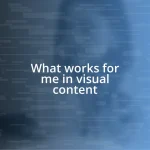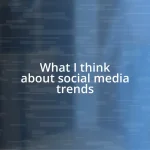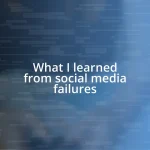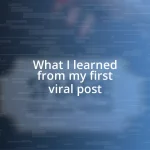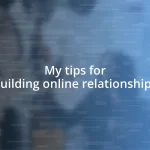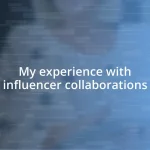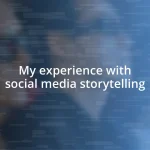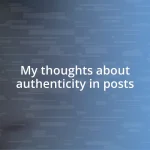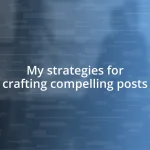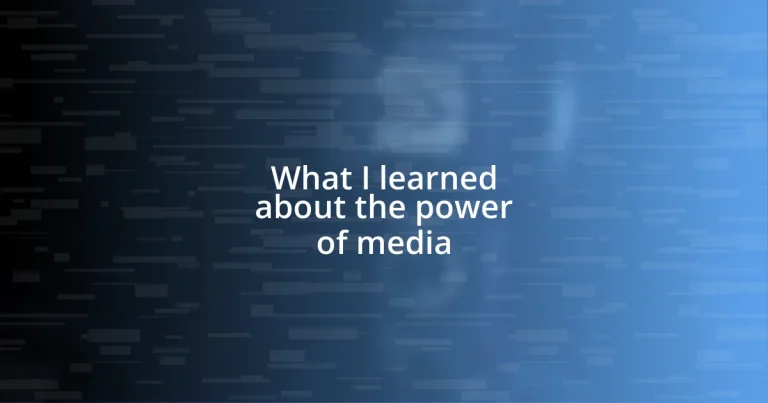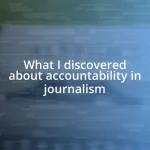Key takeaways:
- Media profoundly shapes perceptions and emotions, influencing individual beliefs and societal norms.
- The evolution of media has empowered users to participate actively, amplifying diverse voices while also posing challenges like misinformation.
- Building media literacy and personal strategies enhances critical thinking, fosters informed dialogue, and supports effective advocacy efforts.

Understanding media’s influence
When I think about media’s influence, I can’t help but reflect on my childhood. I remember how I would get lost in the stories on my favorite television shows, often believing that the characters were almost like friends. It hit me then—media shapes not just what I think is entertaining but also what I believe about the world and the people in it.
Have you ever noticed how certain images or stories stick in your mind, long after you’ve seen them? I find it fascinating how a single news report can sway public opinion significantly, sometimes even leading to conversations around heated topics. This power of media to shape perceptions is immense and can lead to real-world actions; I often ponder: what responsibilities do creators and consumers of media bear in this dynamic?
As I dive deeper into this subject, I realize that media doesn’t just reflect reality; it creates it. I’ve experienced how advertisements can stir feelings I didn’t even know I had—making me crave things I never thought I wanted. It makes me wonder, how much of my own choices are influenced by the media I consume daily? This relationship is complex and worth exploring further, as it underscores the pivotal role media plays in shaping societal norms and individual behaviors.
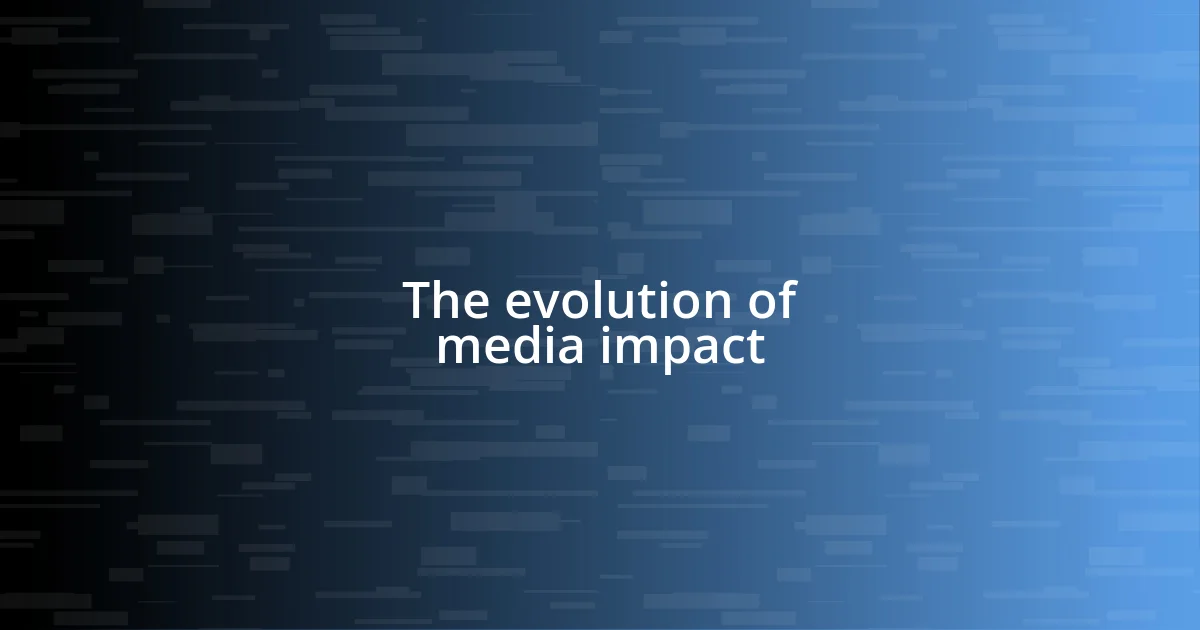
The evolution of media impact
The impact of media has evolved dramatically over the decades, transforming not only how we consume information but also how that information shapes our perceptions. I recall using my first social media account, feeling an overwhelming mix of excitement and anxiety. Suddenly, I wasn’t just a passive consumer; I was part of the conversation, shaping narratives that affected countless others. That pivotal shift from traditional forms of media to interactive platforms showcased how the audience’s role grew from viewer to participant, wielding considerable power in shaping public discourse.
- Media now amplifies voices that might have otherwise gone unheard, democratizing influence in a way that was unimaginable in earlier times.
- This evolution has allowed social movements, like Black Lives Matter, to gain traction and visibility through hashtags and user-generated content.
- However, alongside this empowerment comes the challenge of misinformation—an issue I often grapple with myself as I navigate through countless headlines and online opinions.
The way I perceive media’s role in my life continually shifts as I witness its evolution. It’s a journey that constantly reminds me of both its power and the responsibility that comes with it.
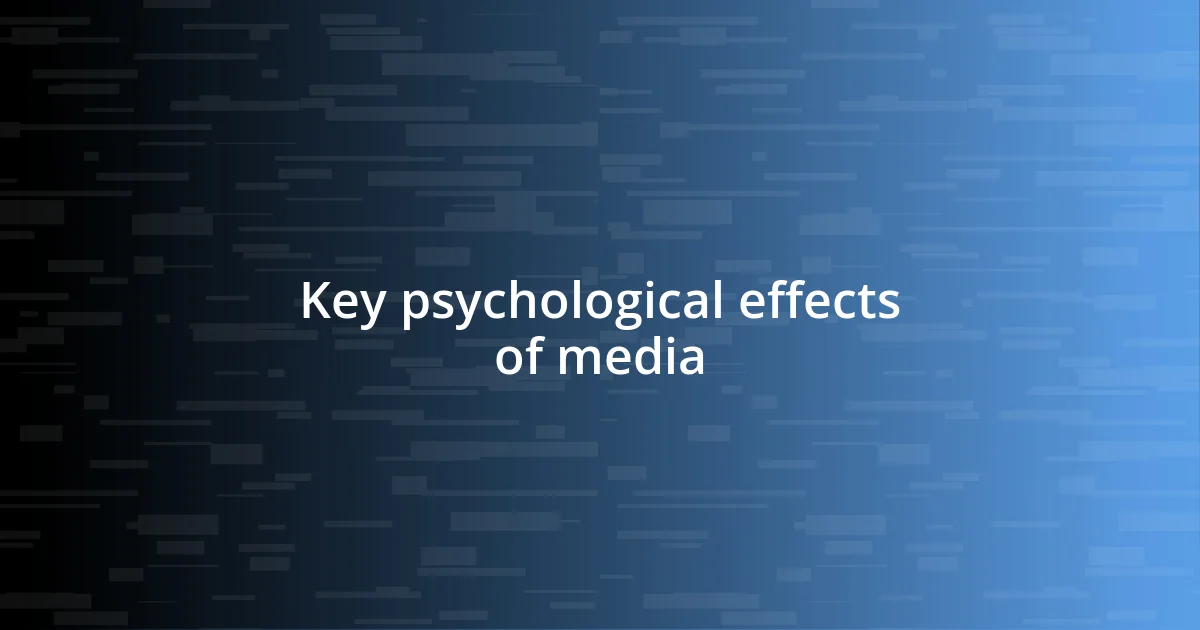
Key psychological effects of media
The psychological effects of media are profound and multifaceted. I often reflect on how seeing images of global events can evoke strong emotions within me, such as empathy or anger. It’s intriguing to consider how repeated exposure to certain narratives can shape my beliefs and attitudes over time, leading to a powerful, almost subconscious influence on my worldview.
In a recent experience, while scrolling through social media, I came across a trending video on mental health awareness. The candidness of the speaker resonated with me, reminding me of my struggles. This connection is a testament to media’s ability to foster empathy and create a sense of community among individuals who might feel isolated. It’s almost like the media acts as a bridge, connecting us through shared experiences and emotions, which I believe is particularly important in today’s society.
Moreover, when I think about the idea of “echo chambers,” where we only hear opinions that align with our own, it raises concerns about confirmation bias. I’ve caught myself gravitating toward certain news sources because they affirm my pre-existing beliefs, which can limit my perspective on broader issues. This reflection makes me acutely aware of the responsibility I bear in seeking diverse viewpoints and not allowing media to restrict my understanding of the world.
| Psychological Effect | Description |
|---|---|
| Empathy Development | Media can evoke strong emotional responses, fostering a deeper connection between viewers and subjects. |
| Influence on Beliefs | Repeated exposure to certain stories shapes our beliefs and attitudes in subtle yet powerful ways. |
| Confirmation Bias | People often seek information that aligns with their beliefs, limiting their perspectives on broader issues. |

Media literacy as a tool
Media literacy serves as an invaluable tool in today’s information-rich environment. I often find myself reflecting on how understanding media content can empower me to critically analyze what I see and hear. When I come across sensational headlines or viral trends, I pause and ask myself: “What’s the source? Is this information backed by facts?” This habit not only sharpens my discernment but also encourages me to engage in conversations that revolve around truth and accuracy.
During a recent debate with friends about a particularly divisive news event, I realized how my media literacy skills allowed me to navigate misinformation. Instead of getting swept up in heated emotions or assumptions, I was able to provide credible sources that challenged some prevailing narratives. This experience showed me that being media literate isn’t just about decoding information; it’s about fostering informed dialogues that can shift perspectives.
Moreover, I’ve seen how media literacy cultivates resilience against the rampant misinformation online. For instance, when I encounter conflicting stories about a complex issue, I consciously seek out various viewpoints to get a balanced understanding. This proactive approach not only equips me to make informed decisions but also instills a sense of agency. Isn’t it empowering to know that we have the ability to make sense of the chaos? Embracing this tool enhances our critical thinking and ultimately shapes a more informed society.
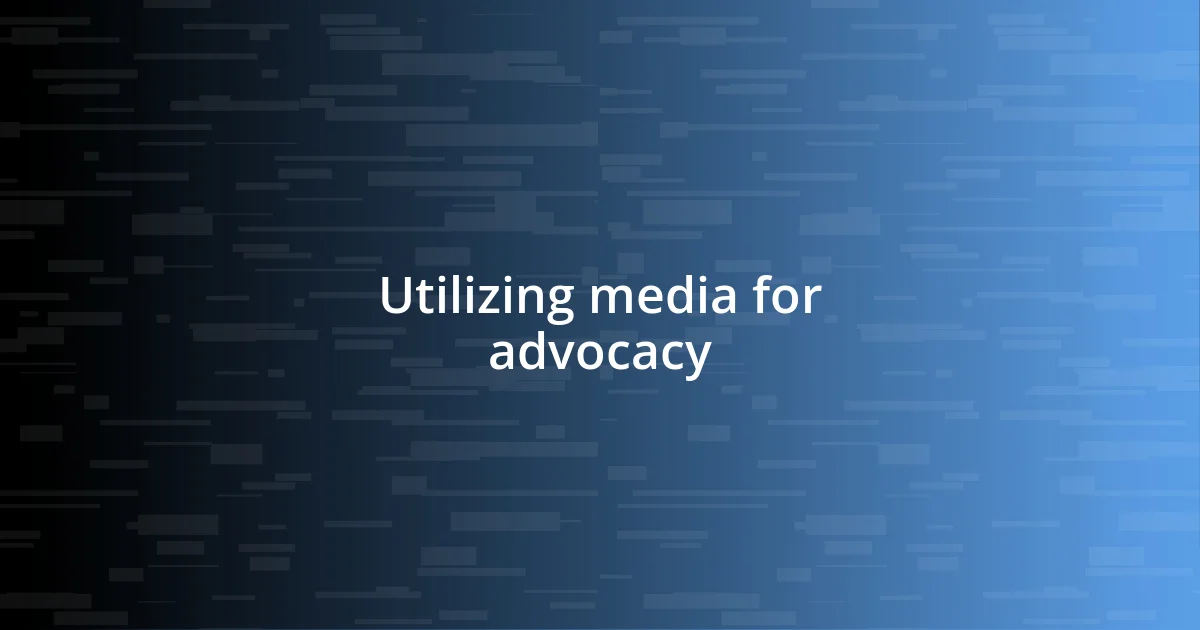
Utilizing media for advocacy
Using media for advocacy can be incredibly effective when you tap into the emotions of your audience. I remember a campaign I supported that highlighted environmental issues through poignant visuals and personal stories. It struck me how these narratives, paired with compelling imagery, stirred not just awareness but a sense of urgency in viewers. The power to evoke strong emotions can inspire collective action, urging people to rally for change.
Social media has become a catalyst for advocacy, creating a space where voices can be amplified. I often find that when I share my experiences related to a cause I’m passionate about, the responses are overwhelmingly positive. Just last month, I posted about a local initiative to support mental health services, and the outpouring of support—stories from others who felt similarly—reminded me of the incredible connections that can be formed online. It truly demonstrates how media can create a community of advocates.
Moreover, there’s something fascinating about how hashtags can mobilize movements almost overnight. Reflecting on past events, it amazes me how a simple phrase can unify voices across the globe. During the #MeToo movement, I saw firsthand how individuals found strength in solidarity, sharing their own stories to break the silence. This not only validated personal experiences but also fostered an environment where advocacy could thrive. Isn’t it remarkable how a few words can ignite such powerful conversations?
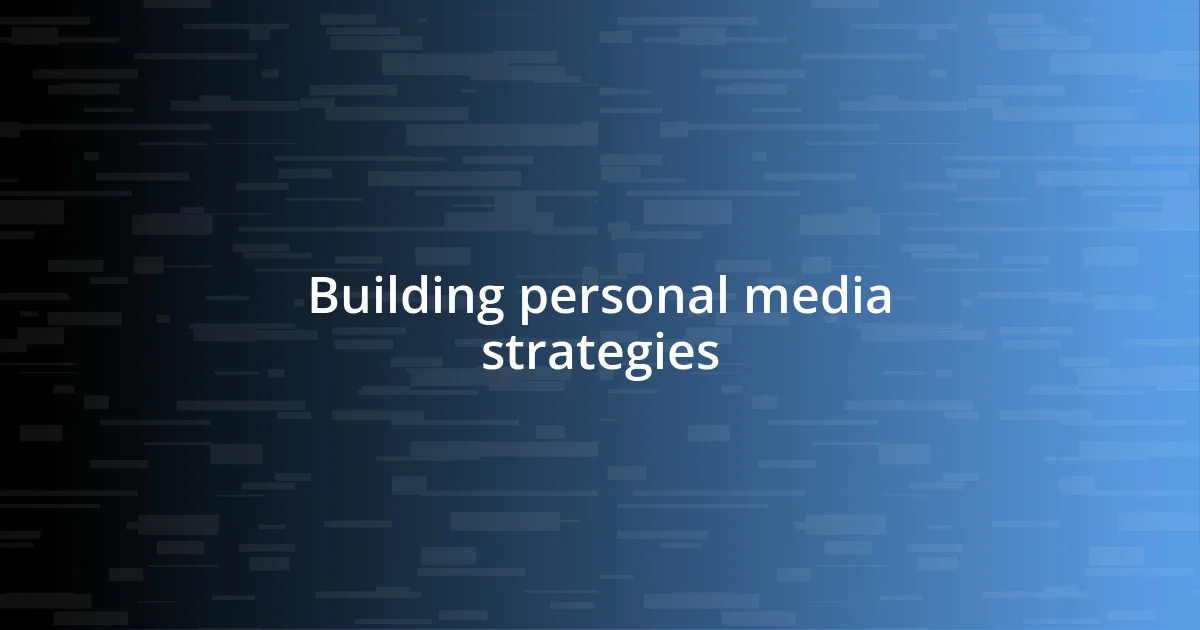
Building personal media strategies
Building my personal media strategy has been a game-changer in how I interact with the information I encounter daily. I’ve learned to identify my goals first—what do I hope to achieve through my media presence? Whether it’s promoting a cause or sharing knowledge, defining this clarity fuels my choices about content and platforms. Have you ever thought about how having a purpose might steer your media engagement? I find it transforms every post into a meaningful interaction rather than just digital noise.
To further refine my strategy, I focus on consistency and authenticity. I remember the time I committed to posting weekly about local community events; it not only increased my engagement but also positioned me as a reliable source of information. Authenticity in voice is key—when I share genuine experiences, it resonates more deeply with others. Isn’t it rewarding to see how being true to oneself can build trust and foster deeper connections?
Networking has also played a vital role in my media approach. By engaging with other content creators and activists, I’ve discovered countless new perspectives. The connections I’ve forged have led to collaborations that enhanced my reach and understanding of various topics. I often ask myself: How can I elevate the voices around me? This focus on community not only enriches my strategy but also nurtures a supportive environment where growth is shared.
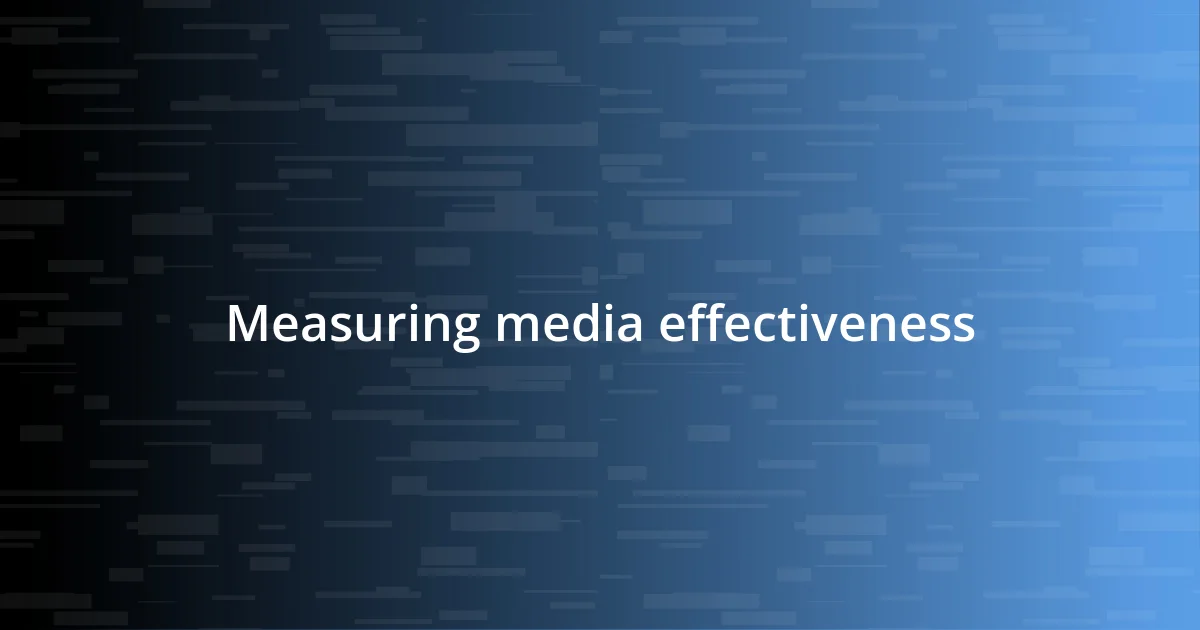
Measuring media effectiveness
Measuring media effectiveness often involves analyzing engagement metrics—likes, shares, and comments are just the tip of the iceberg. I remember a time when I worked on a campaign that tracked these metrics meticulously. It was eye-opening to see how a well-crafted post could generate hundreds of interactions compared to another that fell flat. What I learned is that without this analysis, we risk overlooking what resonates with our audience and missing opportunities for deeper connections.
Beyond numbers, I’ve come to appreciate the importance of qualitative feedback. Surveying audience opinions can reveal emotions, motivations, and perceptions that metrics alone don’t capture. Last year, I launched a feedback campaign after a major advocacy initiative. The heartfelt responses I received provided invaluable insights into how my messages were perceived and what really mattered to them. Isn’t it fascinating how stories can often reveal the true impact of our media efforts?
It’s also crucial to set clear objectives for measurement. Are we aiming for awareness, engagement, conversions, or something else entirely? By defining these goals upfront, I’ve found it easier to determine which metrics to prioritize. I once focused exclusively on reach, only to realize later that deeper engagement leads to lasting change. This shift in perspective taught me that measuring media effectiveness is a journey, where every campaign teaches us something new.
